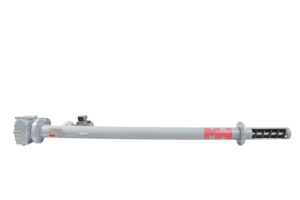SCR Product Brochure.

To find out more about our Screw
Sampler (SCR) please feel free to
download product brochure:
The Screw Sampler (SCR) is designed for continuous or intermittent sample extraction of dry, non-sticky powdered free-falling material from a chute or in a silo.
The SCR is the standard sampler in many cement plants and is also widely used at chemical and power plants.
Variant 1 (standard): The Screw Sampler Bottle (SCR-B) transports the extracted material to the discharge outlet chute where the material by gravity falls into a bottle.
Variant 2: The Screw Sampler Chute (SCR-C) transports the extracted material to the discharge outlet where the material by gravity, via a chute, falls into the subsequent sample preparation equipment.

To find out more about our Screw
Sampler (SCR) please feel free to
download product brochure:

The SCR is driven by a geared motor coupled to a transportation screw which is placed inside a fixed tube with a opening allowing the free falling material to enter.
The SCR can be mounted in chutes (rectangular or circular) with maximum inclination of 30°.
The SCR system is designed to operate in two steps. In the first step, the sample material is extracted, and the screw transports the captured material to the discharge outlet chute. In the second step, the direction of the screw is reversed thus emptying and cleaning the pipe. After a full operation cycle is completed, the system is ready for the next sample without cross-contamination effects.
Material type: Dry, non-sticky powdered free-falling material.
Drive unit: Gear motor.
Unit material: The SCR is made from mild steel and is painted according to M&W standard colour RAL 5010, topcoat Polyester Powder, brightness 30 unless otherwise agreed.
Unit Control: The SCR is controlled from the plant’s PLC system and motor control centre. It is delivered with either a local control unit and/or is controlled by a M&W central control cabinet depending on concept and preference.
M&W central control cabinet: The M&W central control cabinet consist of motor control center, circuit breakers, PLC-system and man-machine interface.
Options
1. The SCR can be supplied with local control cabinet
2. The SCR is also available in an ATEX version depending on requirements.
3.The motor can be equipped with a frequency converter to enable adjustable speed.
4. The SCR can include a secondary motor that drives a cover pipe with the purpose of allowing or avoiding material influx into the screw during periods of no sampling.
5. The SCR can be delivered in a precision version to ensure extraction of very fine particles.
Nota Bene 1
The SCR operates under the assumption that the cross-section of the falling material is of uniform composition, allowing it to be sampled by a linear transect only. The degree to which a SCR can obtain a fit-for-purpose representativity status is dependent upon the specific heterogeneity characteristics of the material sampled. M&W offers customers a facility for quantitative assessment of the performance following one or several types of analysis such as variographic or replicate analyse based on the customer’s material.
Nota Bene 2
With reference to option 5., the precision version can be defined as agglomeration or/and static electric coherence.